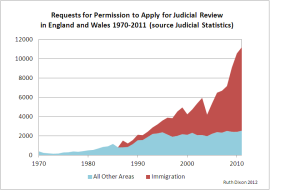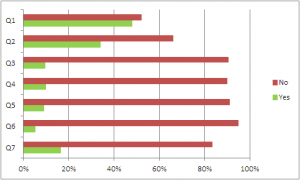One of the most shocking and disappointing elements of how HS2 has progressed over the last two years has been how the Government has treated the consultations. Besides leading questions and lost responses, there has been massive disappointment in how not only the weight of feeling against HS2 has been ignored, but also how any suggestion, no matter how benign or well intentioned has been completely ignored. Whilst in the case of HS2 these issues were fuel for the Judicial Reviews which concluded last week, the Government hopes that the farce of the HS2 consultations will set the bar in future and the chance to challenge in court will be reduced.

This graph shows a) The number of Judicial Reviews in recent years b) David Cameron doesn’t have a clue what he is talking about.
First, instead of consultations having a default 12 weeks, they could in future be as short as two weeks. If this had been the case with the initial consultation on compensation in March 2010, the deadline would have been before hardly anyone knew about it. One of the big complaints about the main HS2 consultation was that it was uninclusive and disenfranchised people who are not online, but the Government is planning to go to a ‘digital by default’ policy. Most worrying is the attitude to consultation as displayed recently by Oliver Letwin MP to the House of Lords Secondary Legislation Committee last week where he said;

Respsonse for the HS2 Consultation. Please note, this includes over 12,000 pre-printed postcards from the the Yes to HS2 campaign, which covered Questions 1 and 2. Stop HS2 did not employ this tactic so all negative responses where from real people in their own words.
So if the purpose of a consultation isn’t to collect views, what is it Ollie? Apparently consultations should be for;
“Discussions of a sensible kind with people that know about the subject in question.”
Sorry, but that very much sounds like “No plebs allowed.”, and in future we can just expect the views of the people the Government deem to ‘matter’ to be listened to in a consultation process. Then again, that does seem to be how the rest of Government works, and looking at the statistics surrounding the responses to the main HS2 consultation that is how consultations seem to be operating already anyway.
